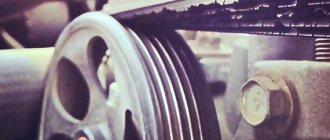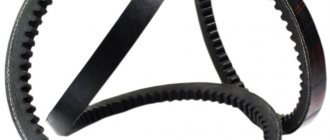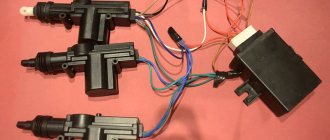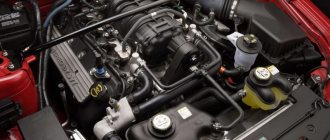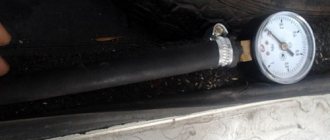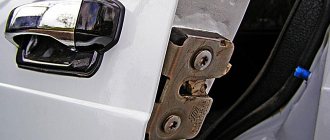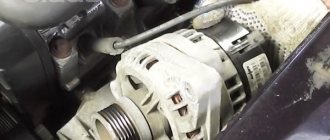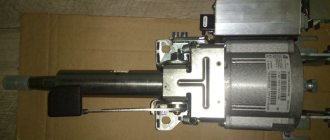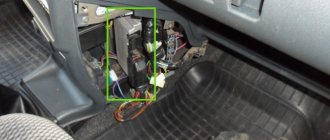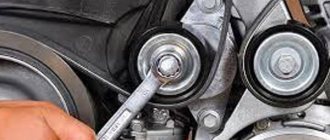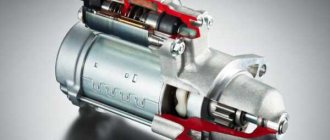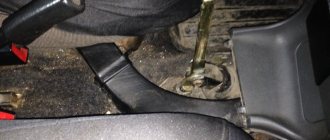During the operation of the car, the owner is faced with many problems, including an unpleasant situation with the alternator belt. He begins, seemingly for no reason, to “whistle”, and it is not so easy to immediately guess why this is happening. In our case, we are not talking about a worn or old belt. Everything is clear here - I replaced everything. No, everything is much more interesting, and, as in an exciting English detective story, we will look for a cause-and-effect relationship.
Inspect the belt and look for reasons why the belt whistles.
So, why does the new alternator belt “whistle”? As it turns out, there are several reasons for this and they are all presented below.
Briefly about the hanging belt
Belt drive is the most common method of transmitting rotation to the generator rotor. The method has been used for a long time and differs from others in its simplicity: only two pulleys on shafts that are connected by a belt.
The belt itself is responsible for a lot. It is he who is responsible for transmitting rotation from pulley to pulley. You should be aware that one part of the belt is tighter than the other . It is the difference between these tensions that determines the traction force and its coefficient.
The belt provides precise transmission and is quiet in operation. High-quality products are able to withstand long-term loads, smooth out shocks and jerks. They are compact, take up little space, but simultaneously operate several important components of the car: generator, pump, air conditioning compressor and power steering pump.
The generator rotor must rotate constantly. This is facilitated by the belt connection to the crankshaft. The pulleys, which are screwed onto the generator and crankshaft shafts, are connected by a belt, which must be flexible.
The “whistle” of the belt is similar to a disgusting clang. It is caused by the belt slipping. The sound of such a whistle is unpleasant and can be heard at a great distance. Of course, you should not drive in such a situation.
Why does the alternator belt whistle?
The creaking or whistling of the alternator belt occurs due to several reasons, namely:
- Insufficient belt tension;
- Belt wear;
- Ingress of moisture or technical fluid onto the drive;
- Wear of pulleys and tension roller;
Let's look at each of the reasons separately to delve into this topic in more detail.
Weak belt tension
When the belt has insufficient tension, when a load occurs on this drive, it slips, which leads to a characteristic sound - a creaking sound. Fixing such a breakdown is quite simple; you just need to check the belt tension and, if necessary, tighten it according to the car’s operating instructions.
Excessive belt tension can lead to breakdown of the units and this drive, namely failure of the bearings.
Belt wear
Quite often, the cause of a squeaking belt is its wear. Using the belt for a long time without replacing it leads to its stretching to such an extent that tensioning it no longer helps and the creaking cannot be eliminated using this method. Such a belt must be replaced to get rid of extraneous sounds in the car.
Ingress of moisture and technical fluid
When moisture gets onto the generator drive, it wets the pulleys and the belt itself, thereby increasing the slip coefficient, which leads to belt slipping. When the moisture from friction evaporates, the belt stops slipping.
With technical fluids, things are much more complicated. For example, when oil gets on the generator drive, it does not evaporate due to friction and remains on it for a very long time. As you know, oil has an excellent slip coefficient, and if it gets on the belt, it does not allow it to work normally. Antifreeze ingress has exactly the same effect on the belt drive.
Pulley and roller wear
When a pulley or roller wears out, the belt tension decreases, its diameter decreases, thereby making the belt tension weaker, which leads to belt slipping and, consequently, squeaking.
Flew off, torn - what will be the consequences?
At the very beginning, I want to answer - what happens if the alternator belt comes off? A very common question for my website and channel. EVERYTHING IS SIMPLE – NOTHING WILL HAPPEN ! Often, a belt drive turns not only the generating unit, but also other units, for example a power steering pump, or an air conditioning pump, etc.
If it falls off or breaks, then nothing bad will happen! Perhaps the power steering and air conditioning will stop working and electricity will be generated, that is, the battery light will be on.
Is it possible to go? Yes, you can, but NOT ADVISABLE! Because the battery will be discharged, the entire load will go to it, it will give up its charge to the ignition system and fuel pumping, and how long it will last is DIFFICULT TO PREDICT! Because the condition of the batteries is different for everyone.
The power steering will not work, that is, the steering wheel will become stiff and it will be very difficult to turn it.
The air conditioning unit or climate control will not work, but this is not so critical here; I would definitely not turn it on if the belt was torn or fallen off!
In general, the conclusion is this: nothing terrible will happen, but you can’t drive for a long time! Only to the nearest station, where the belt drive will be restored again. However, there will be no global breakdown!!! This is not a timing system , everything could be much worse there
Many people ask, if it whistles, does that mean you need to take a new one with you? YES, not always, it happens trivially, the pulleys are dirty or worn out, but more on that a little later.
How to eliminate a whistling alternator belt
If your car has a creaking or whistling alternator belt, this must be eliminated as quickly as possible. First you need to determine the culprit of the problem, be it a belt, roller, dirt or weak tension.
It's a weak stretch
If it turns out that the belt has a weak tension, then it is enough to tighten it to the standard specified in the car’s operating instructions and you can safely continue driving.
Do not overtighten the belt, this can lead to rapid wear of the bearings and their early failure.
Pollution
If there are traces of lubricants (oil or antifreeze) on the pulleys or on the belt itself, they must be eliminated. You can clean the pulleys and belt using carburetor cleaner, as it evaporates quickly and does not leave a greasy residue.
Roller wear
The next step is to inspect the tension roller, which should rotate freely and not bite in certain places, and also not make any extraneous sounds when rotating.
Belt wear
We assess the condition of the belt; it should not be dry or have signs of cracks. An old belt can dry out, losing its meshing properties, which can lead to the belt slipping on the pulleys and, consequently, to extraneous noise and creaking when the engine is running.
Basic faults
A whistle is already a malfunction - there are not many of them in this unit. You have to say “heater” - either it works or it doesn’t. If the stove does not blow at all, this means the electric motor is jammed or the brushes are worn out. If you were still skating with a bang, and then at one point it disappeared, and the heater stopped working, then it’s definitely an engine failure, most likely the problem is in the bearing or bushings.
Therefore, in 70% of cases, lubrication really helps, but if you have been driving for a long time with noise, it is possible that the bearing is already worn out. Therefore, as soon as noise appears, crackling and so on, we disassemble the stove and clean it. What else I would like to note on our VAZs, especially on the “classics”, bushings were used instead of bearings; after they were worn out, they needed to be replaced, however, many craftsmen still install bearings on the VAZ heater - I think this is correct!
Starter
There are several reasons for this behavior. In order to understand the reasons in more detail, you need to know the starter design and operating principle. It consists of an electric motor, on the shaft of which an overrunning clutch with a drive gear is installed. In everyday life, the clutch and gear are called bendix. The design also includes a starting relay with a solenoid. This design is called a “traction relay”. It is connected to the clutch by the starter activation lever.
This design works as follows
. When turned on, the electric motor begins to rotate the bendix. At the same time, the traction relay, having activated, moves the overrunning clutch forward using a lever.
As a result, the gear meshes with the teeth of the flywheel and spins the engine. After the engine starts, the overrunning clutch is activated. This protects the starter from damage. When the current supply to the device is turned off, the relay stops working and returns to its original position. Passenger car starters usually use a roller-type overrunning clutch.
There is only one reason for the grinding noise at startup. For some reason the Bendix cannot fully engage the flywheel. Therefore, when starting the starter, a grinding sound of skipping teeth occurs. This problem needs to be fixed as quickly as possible. Otherwise, the flywheel and starter gears may be damaged. You need to check the following points:
- First, check the starter mounting. Sometimes vibration can cause the mounting bolts to come loose. In this case, the starter becomes warped and the gear loses full contact with the flywheel. In any case, remove the starter and check the condition of the bendix;
- Sometimes the problem can be caused by gear wear. In this case, the starter's performance decreases. When starting the engine, you will hear the grinding sound of the bendix moving around. Over time, the starter will not be able to turn the flywheel at all. After removing the part from the machine, you can see the gear wear with the naked eye;
- Sometimes the Bendix does not move well along the shaft and simply does not reach the flywheel. In this case, remove it. You need to anoint the shaft with any motor oil (or whatever you have on hand). Also check the operation of the traction relay.
These are the main causes of a grinding noise at startup associated with this particular part.
Most often you will find . A crackling sound when starting can also occur due to problems with the starter's power supply. It appears when the positive wire is loosened. If there is poor contact, a spark discharge occurs, which is what produces a crackling sound. Check the wire. Tighten it if necessary.
Flywheel
. The cause of the grinding noise may be in the engine. If the flywheel teeth are worn too much, they cannot form full contact with the starter gear. As a result, you can hear an unpleasant grinding noise. It is advisable to replace the flywheel. Otherwise, wear on the bendix will increase and you will have to change it regularly.
Since we're talking about the flywheel, read our two materials on this topic.
Engine grinding when starting is quite common, especially for older cars. But this malfunction did not bypass new vehicles either. The occurrence of this problem is associated with the failure of one or more elements in the motor.
Causes
Why is there a crackling and grinding sound when starting the engine? This question is often asked by beginners and not-so-motorists. Many people are frightened by the strange sound heard when starting the engine. Although in many cases this is not a difficult problem. But it still needs to be eliminated, and for this it’s good to know where to look for the problem. There are several places that produce crackling and grinding noises during startup:
- Starter;
- Flywheel;
- Roller mounting bolt (timing).
Knowing the main places of breakdowns, you will quickly find out where the main problem is. For a more accurate diagnosis, open the hood and ask someone to start the engine. If there are problems with the starter and flywheel, a cracking noise will be heard from the rear of the engine when the bolt is unscrewed at the front.
Conclusion
Grinding and crackling noises in the power unit indicate that some engine parts have failed. So, the grinding noise is accompanied by a malfunction in the starter or flywheel. As for the crackling sound, the situation is much more complicated - most likely the problem is hidden in the crank mechanism or in the cylinder head.
Even an inexperienced car enthusiast will say that the main unit in any vehicle is the internal combustion engine. If a malfunction occurs in the operation of this unit, the driver will know about it immediately by the behavior of the car. One of the common problems in engine operation is the appearance of extraneous sounds. Why you hear a whistle and what to do in this case - this material will help you understand the problem in detail.
[Hide]
Clutch is a frequent source of whistles and rattles
A slipping clutch is a fairly common problem in modern cars. Our mode of operation of transport is quite complicated; cars have a hard time in cities. It is the clutch that especially suffers from urban travel, as it constantly overheats and is forced to suffer from continuous use. Clutch problems are difficult to fix on your own, but you can identify them as follows:
The clutch will have to be repaired at a service station. Even with some experience in plumbing, it is very difficult to understand modern clutch and gearbox systems. Therefore, it is easier to entrust the work to specialists and not waste your time. The most reasonable solution for domestic cars is to replace the complete clutch. For many modern foreign cars, this process will be too expensive and require huge expenses. So the owner will have to make a decision based on the budget.
Source
A grinding noise is heard when starting the engine
If the driver turns the ignition key to the “start” position and at this moment a grinding noise is heard, and the noise disappears after the engine “cages” and starts working on its own, then the most common cause is considered to be a faulty starter.
If, when starting the engine, you hear the starter grinding whether it is cold or hot, then there may be several reasons for such a malfunction.
As a rule, it is necessary to check the solenoid relay, starter bendix and. The fact is that the bendix may not engage with the flywheel properly, resulting in a crackling sound or a characteristic starter grinding sound when starting the engine.
